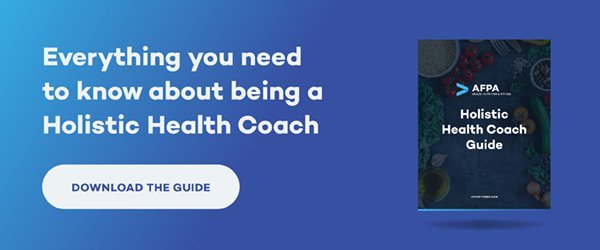
Today, half of all Americans are battling a chronic disease, and one in four have multiple chronic conditions. By 2030, these chronic conditions could cost sufferers upwards of $47 trillion in healthcare spending. The factor that weighs heaviest in chronic conditions? Bad habits.
Changing habits is hard, and for most people, one habit alone isn’t to blame—it’s multiple negative habits. This is where the holistic health coach plays a powerful role, by helping clients reframe and change a host of negative social, psychological, spiritual, and physical habits.
With plenty of passion and the right training, a holistic health coach can create lasting change in countless lives.
What is a holistic health coach?
A holistic health coach uses an integrative approach to lifestyle, diet, and fitness changes in order to help clients achieve their health goals. Most importantly, holistic health coaches look beyond diet and exercise alone to evaluate and create an overarching plan for changing negative habits based on a client’s psychological, spiritual, social, and physical well-being.
With traditional medicine, patients often see a series of specialists, each of whom treats one specific symptom or issue. A holistic health coach takes a different approach, by creating a plan for the whole person. The holistic approach honors the reality that the body is a complex and interconnected system of many parts that can benefit from holistic, sustainable, long-term solutions.
What does a holistic health coach do?
In general, health and wellness coaches have the skills, training, and passion to improve health outcomes by crafting personalized plans for their clients. In fact, health and wellness coaching has been shown to be an effective strategy for individuals battling obesity, heart disease, diabetes, and even cancer. Holistic health coaches in particular have many tools in their arsenal, including:
- The power of positive psychology: By focusing on a person’s strengths (not weaknesses) to encourage behavioral change, a holistic health coach can help a client maintain a positive and healthy mind-set while working toward health goals.
- Skills to promote habit reversal: A holistic health coach encourages clients to make healthy choices in order to reverse bad habits and promote healthy eating, increase physical fitness, manage stress, get plenty of sleep, and more.
- The ability to motivate: By encouraging clients to prioritize self-care, holistic health coaches help them visualize and work toward achieving their goals based on their unique experiences (e.g., “I am going to change my lifestyle so I can have a healthy pregnancy and birth”).
- Supplemental services: Holistic health coaches also often take supplemental certification courses to provide other services, such as counseling, talk therapy, healing touch, or reiki.
To become a holistic health coach, all you need is a commitment to helping others, a love of healthy living and fitness, and formal education like a certification from a nationally recognized certifying organization.
For holistic health coaches, the job opportunities are endless. Certified coaches can work in gyms and fitness centers, private medical offices, corporate environments, and more. In addition to consulting one-on-one with clients, holistic health coaches also put their passion into practice by:
- Developing nutritionally rich programs for healthy meal planning
- Lecturing or speaking on holistic wellness and behavior change
- Hosting wellness retreats
- Creating health and wellness blogs or YouTube channels
- And more!
What a health coach is not
Although holistic health coaches are knowledgeable in countless health and wellness topics, they are not licensed nutritionists, registered dietitians, or certified personal trainers—unless they also have certifications and qualifications in those fields. Additionally, a health coach isn’t a licensed therapist, although many do offer supplementary counseling services. If you don’t have the credentials for creating a fitness plan or for providing therapy services, you could be opening yourself up to liability issues, so stick to what you know, and pursue supplementary certifications if you’d like to help your clients with these additional services.
What are the benefits of getting certified?
Getting certified not only helps boost your clients’ confidence in your abilities and commitment to excellence and professionalism, it also opens doors for further certification and accreditation by important health and wellness governing bodies. In fact, if you receive your Holistic Health Coach Certification with AFPA, you’re eligible to become an American Association of Drugless Practitioners (AADP) board-certified practitioner. Plus, you can benefit from the following associations:
As more and more people approach being “healthy” as living the most vibrant life possible and not just as the absence of disease, holistic health coaches are playing a more important role than ever. Download our Holistic Health Coach Guide now, and learn how you can launch a career that allows you to help others achieve their optimal health by embracing healthy, holistic, life-changing habits.

0 Comments